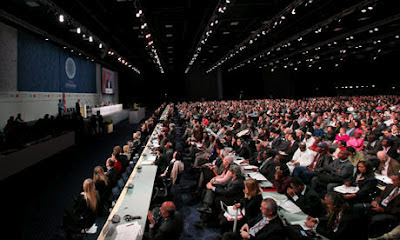India
so called growing economic power house of the world, which is in its full speed
on development track. Entire world is recognizing it‘s all round developments
activities, economic potentials, global economic driver capabilities and very
key influences on global economy in future. A country with numerous missions
& visions like 2020, 2050…. so on. Why not..? Every country should have one
for growth and development, but at what cost.?
India
is also member or leader of various groups of underdeveloped or developing
nations on numerous issues (economy, environment and sustainable growth etc). On
environment front most of the members of such groups blame, on various occasions,
to developed countries for not giving sufficient subsidies and helps to
implement the measures for the sustainable growth along with rapid economic
developments, but actually they hide
their own incation. There are points, negotiations and disagreements on these
issues.
Most
of the environmental summits go in
waste only in blaming each other and discussing who has done more harm to
environment and who has less ... and time up. Is there going to be a way out by
such attitude? Is there should be one as an eye opener to tell you how dirty,
polluted and filthy your house is? If you clean your house, is it the developed
nations are going to make it dirty or pollute it or its advantage will be going
to them. Growth is must and should be on priority but providing clean, green, safe,
healthy and hygienic ambience, environment and nature to your citizens is also
must.
Take
a case of India with so much cultural,
social and natural diversities, has started its economic growth race blindly. It
has gain enough so far but lost also equally if not more. With uneven
industrial distributions and lack of proper planning has given it population
congestion at industrial areas, overcrowded cities causing more pressure on natural
recourses of one particular place, pressure on infrastructure, pollution and
many more uncountable unwanted things.
Indian
cities are extremely ill prepared to address the environmental fallouts of the
aggressive building construction that is underway, according to Centre for
Science and Environment. A statement issued by the centre said that 70% of the
building stock that will be there in 2030 is yet to be built in India but
without resource efficiency measures this will severely affect liveability of
cities.
Since 1991,
Indian policies on economic reforms have sidelined environmental concerns. The
hard fought gains of the 1970s and 1980s (including new policies and laws on
forests, wildlife, environment protection, water and air pollution, and the
creation of a dedicated ministry) have been increasingly diluted, or
sidestepped, in the blind pursuit of economic growth.
The
2010 McKinsey estimates confirm that the national power demand can be reduced
by as much as 25% in 2030 by improving energy efficiency of buildings and
operations. The Bureau of Energy Efficiency has also stated that even existing
buildings have the potential to save 30-50% of energy. Similarly, substantial
water savings is possible. Only by improving the water efficiency of the water
fixtures the water demand can be reduced by more than 30% , said the statement
by CSE.
Is
There Hope?
With
a dedicated ministry (MoFE) and continuous
active pressure from civil
societies and NGOs govt has drafted and implemented many policies and acts.
A
few proposals in the 11th five-year plan, a committee to recommend a low
carbon economy, state governments declaring a move towards organic production,
rights-based laws. These are a few such signs. But lost, nonetheless, in
the bigger picture of ‘growth at all costs’. Much more hopeful are the
thousands of grassroots initiatives in sustainable agriculture, rural and urban
renewal, decentralized water harvesting and energy production, meaningful
community-based education and health, empowerment of the poorest that dot the
country. Learning from them, helping them scale up and spread out, would be the
single-most important step for the government.
Hopes lies with many civil and NGOs societies
working at the grassroots level like CSE(Centre for Science and Environment) and Kalpavriksh .
--“A
town is saved, not more by the righteous men in it than by the woods
and swamps that surround it.” - Henry
David Thoreau
Share
views and any real doings and hopes for degrading nature that is worth wide
range implementation. Your concerns and affection to Environment.
For Further Reading »
 Our Planet
Our Planet

0 comments:
Post a Comment